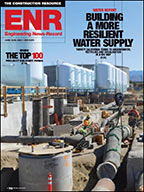Leadership begins by taking the first step and not waiting for others to act. As a profession, we have bemoaned the failings of politicians and bureaucrats to make the investments we believe are required to have an efficient and effective national infrastructure system—and by extension an effective and efficient competitive national economy.
We developed tools like the American Society of Civil Engineers’ report card to measure the inaction of others and have spent a considerable amount of time talking to ourselves about how bad things are and how they should be fixed.
Now is the time for us to take action and not wait for others. We must use the power we have always had by virtue of the two core activities of our professional societies: to educate and issue standards. The focus of each of these activities must shift in significant ways in order to reclaim our leadership role.
The nation’s professional engineering societies have an obligation to educate the average American. Perhaps more strongly, we must market to them, the elected officials’ “customer,” the average American citizen.
This marketing cannot be in oblique terms but must be specific and understandable. Simply put, we must educate Joe the Plumber, about whom we have heard so much in the recent election.

PRIETO
Our professional societies are the subject-matter experts. Joe the Plumber is the user of our nation’s infrastructure, but does he really know what it is? Does he really understand how inefficient and dangerous it is becoming? Does he understand not only what is possible in fixing our infrastructure but also the powerful economic driver it can become? Can he see the forest for the trees?
Infrastructure is invisible to Joe, and the professional societies must shine a bright light on it. We must educate Joe like there is no tomorrow, because for Joe’s children there may not be a tomorrow, at least from a competitiveness standpoint. With a strong commitment to education, others will step forward to lobby. We must define the battlefield.
The nation’s professional societies need to create and fund a national infrastructure education program. This is not just another nice idea but essential to the competitiveness of the U.S. engineer and our nation. Now is the time to act with one purpose and one voice. The professional societies must lead by example and not just define and applaud leadership.
Our technical societies develop with great care and diligence the technical standards that guide our design and engineering of the nation’s infrastructure. In turn, professional engineers in each state and municipality adopt these standards, or even more stringent criteria, and codify these in state regulations. The reality is that state engineers simply do not adopt less stringent regulations than the national standards, if for no other reason than not wanting the risk.
Our technical societies increasingly define the measures for determining the condition of infrastructure after it is deployed, such as ASCE standards that lead to the definition of a bridge as “structurally deficient” and “functionally obsolete.” Our technical societies have stopped short of exercising their full power with respect to causing corrective action to occur.
Technical standards should not stop at defining something as unsatisfactory; they must go one step further and lay out the methodology to determine in what time frame they must be brought up to a satisfactory level based on a full consideration of the risks they represent. For example, if a technical standard states that a bridge needs to have its condition improved within a defined time frame (based on a standard defined-risk methodology), would state engineers seek to incorporate anything less in state regulations? Would any executive or legislature ignore their own state safety regulations without peril?
Saying something is not up to standard and then quantifying it is a good first step, but now the profession must use its skills to say what needs to be done to fix it and make it right. It is not acceptable to wait for others who are without the necessary technical or understanding of infrastructure risks and potential, to make it right.
Our professional engineering societies have a true leadership opportunity at this moment in history. Do we have the courage to seize the moment?



Post a comment to this article
Report Abusive Comment